May 5, 2024 | 12:06 GMT +7
May 5, 2024 | 12:06 GMT +7
Hotline: 0913.378.918
May 5, 2024 | 12:06 GMT +7
Hotline: 0913.378.918
Capital, a crucial factor in the development of cooperatives, has experienced significant difficulties in Vietnam over the years. Consequently, on April 23, the Vietnam Cooperative Alliance, in coordination with the State Bank of Vietnam, organized the workshop on "Resolving issues in accessing credit for collective economic areass" in Hanoi and online, with over 2,400 participants nationwide. Ms. Cao Xuan Thu Van, Chairwoman of the Vietnam Cooperative Alliance, and Mr. Dao Minh Tu, Deputy Governor of the State Bank of Vietnam co-chaired the event.
By the end of 2023, Vietnam has a total of 30,698 cooperatives, and 137 cooperative unions. Notably, there are 20,500 agricultural cooperatives (accounting for 66.7%) and 10,200 non-agricultural cooperatives (accounting for 33.3%). According to Mr. Nguyen Anh Duc, General Director of the Saigon Union Of Trading Cooperatives, the collective economic model, with cooperatives as its foundation, is gradually developing to become an important factor in maintaining social security and political stability at the grassroots levels, as well as promoting economic and social development.
However, the majority of cooperatives face significant challenges in the expansion of their production scale. Namely, Vietnamese cooperatives are typically limited in terms of capital, scale of operation, and member connectivity. Additionally, their lack of credibility or market recognition, coupled with inefficient activities, results in a limited access to credit.
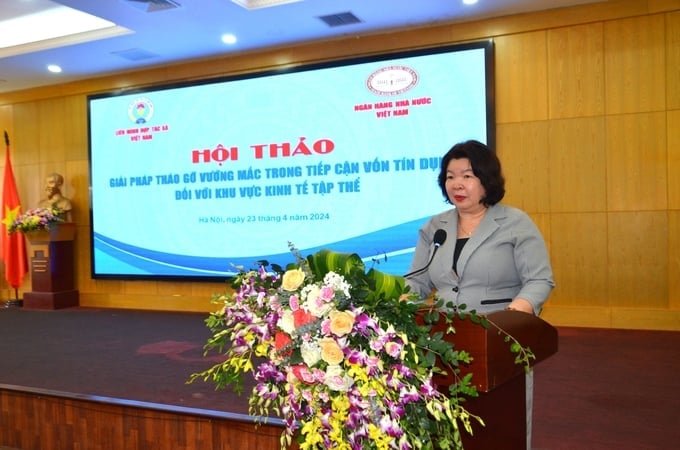
Ms. Cao Xuan Thu Van - Chairwoman of the Vietnam Cooperative Alliance. Photo: Duong Dinh Tuong.
Reportedly, only two percent of cooperatives nationwide have access to credit from financial institutions, and approximately ten percent of cooperatives have access to loans from central and local funds. Consequently, only 0.5 percent of cooperatives nationwide have access to loans from financial institutions, despite the significant capital demand in the collective economic sector.
The main reasons for the limited access include: Firstly, multiple businesses and cooperatives are facing challenges in terms of production and trading. Secondly, poor management and operational coordination, small scale of operation and underdeveloped supply chains are the common characteristics of many cooperatives. As a result, they are subject to high market risks and unfeasible production and business plans when applying for loans.
Thirdly, due to their outdated production facilities and equipment, cooperative assets typically have low collateral values, which limits finance for high-value projects. Fourthly, the majority of cooperatives' financial reports fail to meet the requirements for audited financial reports in loan applications because they are not independently audited. Fifthly, banks often avoid granting unsecured loans due to the lack of collateral.
Regarding access to cooperative development support funds, as of September 30, 2023, there were 50 local cooperative funds nationwide. Namely, there were 7 funds with working capital exceeding 50 billion Vietnamese dong; 16 funds with working capital ranging from 20 to 50 billion Vietnamese dong; 21 funds with working capital ranging from 5 to 20 billion Vietnamese dong; 3 funds with working capital below 5 billion Vietnamese dong; and 3 funds without charter capital. According to Article 23, Clause 1 under Decree 45, the loan limit for a single client cannot exceed 15% of its charter capital. Given the typically modest charter capital of most cooperative funds, the lending capacity per client remains relatively low. Consequently, these funds primarily cater to meeting short-term capital demands for sustaining operational activities, instead of fulfilling broader, and longer-term capital requirements.
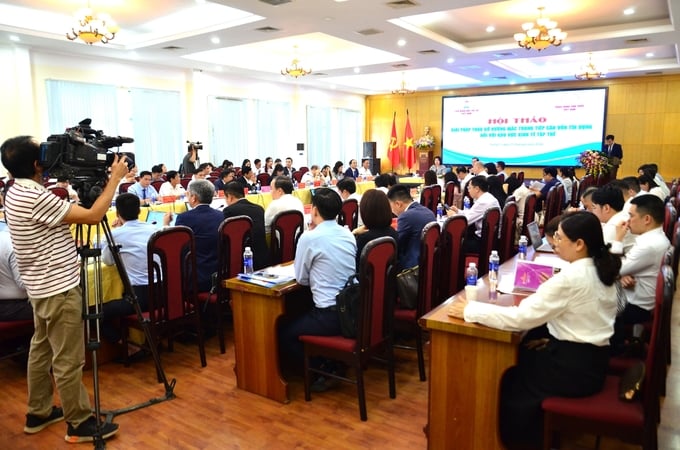
An overview of the workshop. Photo: Duong Dinh Tuong.
Without access to loans from credit institutions or cooperative funds, cooperatives often resort to borrowing directly from their members. However, according to Article 115 under the Law on Cooperative, cooperatives and cooperative unions are required to cease their internal credit activities.
Accordingly, Mr. Duc proposed several solutions: Firstly, cooperatives need to enhance their management capacity, and innovate to produce high-value commercial products that can compete in the market and meet the increasing consumer demand. Secondly, cooperatives must prioritize transparency in accounting practices. Namely, their financial reports must be audited by an independent auditing firm to build trust among cooperative members, financial institutions, and government agencies, thereby facilitating access to loans.
Thirdly, local People's Committees must instruct their respective departments, sectors, socio-political organizations, and related agencies to regularly monitor cooperative activities. Subsequently, stakeholders need to propose solutions to address challenges and promote the development of collective economic components in the area. Fourthly, banks should establish separate loan policies with appropriate lending procedures and requirements tailored to cooperative activities, distinct from those applied to other types of businesses. Finally, Mr. Duc suggested the abolishment of the regulation on the cessation of internal credit activities.
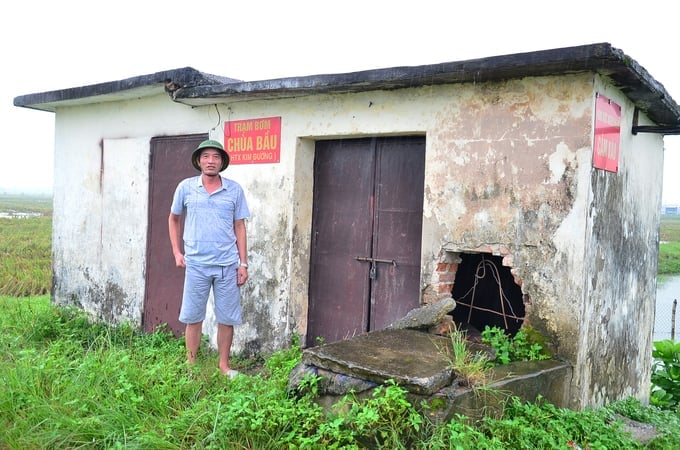
A pumping station belonging to a cooperative in suburban Hanoi. Photo: Duong Dinh Tuong.
Mr. Ta Viet Hung, Director of the Green Farm Investment and Ba Vi Cattle Development Cooperative in Hanoi, recounted that in 2021, he used his land use rights as collateral and was granted a loan of 500 million Vietnamese dong by the Hanoi Cooperative Development Fund to support the cooperative activities, which he successfully repaid in 2024. Between 2020 and 2021, the cooperative received a loan of 750 million Vietnamese dong from the Vietnam Cooperative Development Fund to purchase two transportation trucks. Notably, these loans were secured against assets formed from the borrowed capital. So far, the cooperative has repaid two-thirds of the debt.
"Before receiving the loan from the Hanoi Cooperative Development Fund and the Central Fund, our cooperative applied for loans from several commercial banks. However, we were unable to meet the loan requirements and conditions, such as collateral assets, business plans, and financial reports. In my opinion, the government needs to establish specialized mechanisms tailored to different regions and industries nationwide. This would involve streamlining unnecessary requirements and procedures for cooperatives seeking preferential loans; and providing the option of using assets formed from the borrowed capital as collateral. Extended loan terms are crucial to ensure the sustainability of cooperative activities.
Furthermore, we need to support the specialized training of cooperative leaders based on their capabilities. This training should emphasize management, marketing, market analysis, business planning, negotiation skills, and more. We can address the issue of small-scale and fragmented production activities by actively involving cooperatives in the value chain, and maximizing their potential and capabilities. It is crucial for credit funds, support funds, and the banking industry to also participate in this value chain."
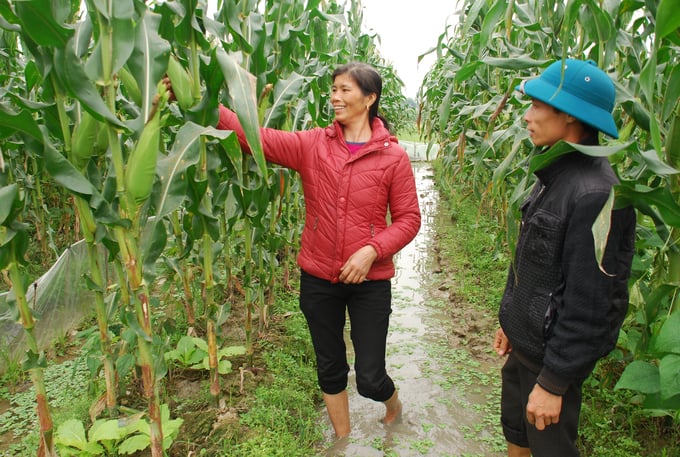
Corn production at a cooperative in suburban Hanoi. Photo: Duong Dinh Tuong.
By the end of February 2024, the total loan amount granted to cooperatives and cooperative unions nationwide reached 6.024 trillion Vietnamese dong, with approximately 1,200 particpating cooperatives and cooperative unions, representing a decrease of 1.69% compared to the end of 2023. The workshop highlighted that these challenges are the result of cooperatives failing to meet loan requirements. Consequently, stakeholders must establish appropriate solutions and support mechanisms to aid cooperatives, which include support mechanisms, policies, and guiding documents to implement the Law on Cooperative (effective July 1, 2024). State resources such as the Cooperative Development Fund, and policies pertaining to technology and market development should be utilized. Additionally, each cooperative and its member must focus on organizing activities, and managing an appropriate, effective collective economic model.
With the aim of promoting credit growth for the collective economic sector, the State Bank will request credit institutions to grow credit safely and effectively, focusing on priority sectors as per the government's directive. This includes facilitating access to bank loans; innovating loan procedures to simplify and tailor them to cooperative clients while ensuring compliance with legal regulations and credit quality management; researching and implementing credit products tailored to the characteristics of the cooperative economy and cooperatives; enhancing member connectivity to address difficulties in accessing capital.
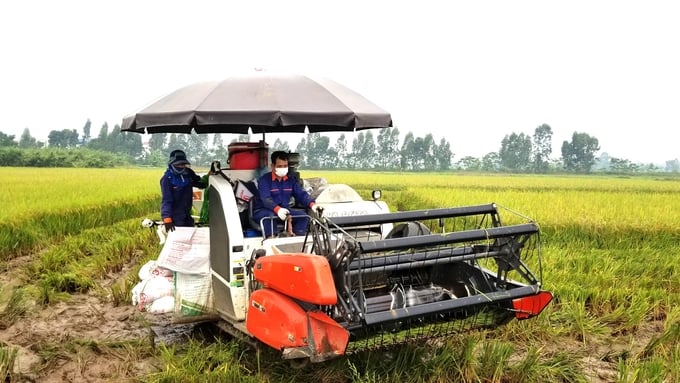
The majority of Vietnamese cooperatives are experiencing difficulties in acquiring funds for mechanization investment. Photo: Duong Dinh Tuong.
Additionally, the State Bank will continue to improve its credit policies to facilitate general loans as a whole, and loans for cooperatives in particular. This includes conducting surveys, assessments, and summarizing the provisions of Decree No. 55 on credit policies for agricultural and rural development to propose amendments that facilitate access to credit for entrepreneurs and cooperatives. Additionally, there will be ongoing research to amend Circular No. 02 on restructuring debt repayment schedules and maintaining debt groups for clients. The State Bank will also continue to review and amend Circular No. 39 to promptly address emerging difficulties in practice after receiving government approval.
Translated by Nguyen Hai Long
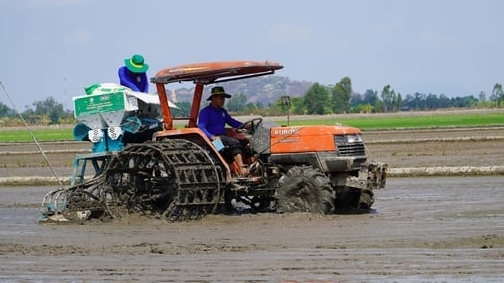
(VAN) According to the draft payment scheme for emission reduction results from the Project for one million hectares of high-quality rice, farmers in cooperatives and cooperative groups will be the primary beneficiaries.
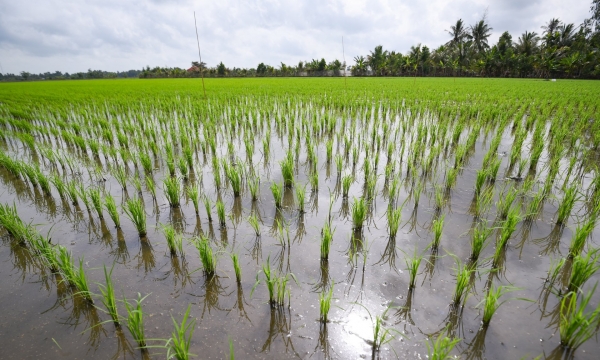
(VAN) Minister Le Minh Hoan has urged for a solution to effectively communicate the benefits of applying emission-reducing agriculture practices in the 1 million hectares of high-quality rice project in the Mekong Delta.
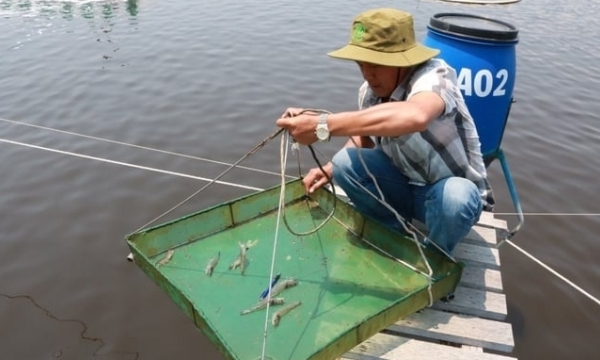
(VAN) According to the Department of Animal Health, Vietnam currently has 32 disease-free shrimp production facilities nationwide, including 27 facilities with a post larvae capacity of 38 billion per year.

(VAN) Vietnam Oil and Gas Group (Petrovietnam) has just launched a tree planting ceremony in Tran Hoi commune and inaugurated a rural traffic bridge in Khanh Binh Tay Bac commune, Tran Van Thoi district.

(VAN) On April 25, Vinamilk held the 2024 General Meeting of Shareholders and set a target of 4.4% growth in revenue and 5% in pre-profit tax.
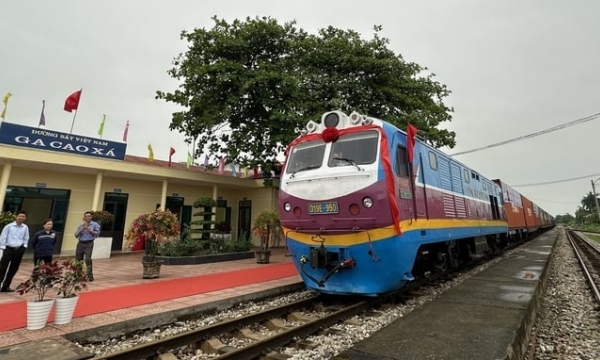
(VAN) On May 2nd, Vietnam Railways and the Hai Duong People's Committee inaugurated the first train from Cao Xa station to international transportation.
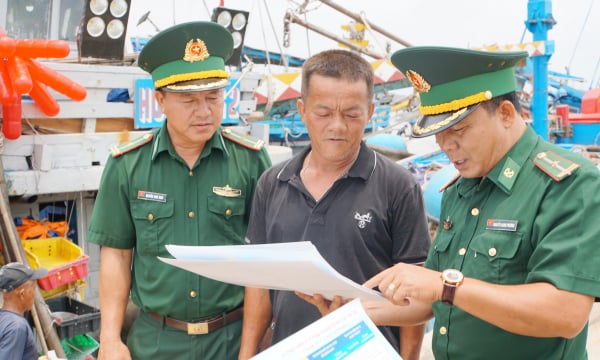
(VAN) MARD has sent a paper to the Ba Ria – Vung Tau province on the prioritization of combatting IUU fishing and the upcoming fifth inspection by the EC delegation.